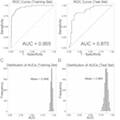Abstract
Background
Recent animal and human studies reveal distinct cognitive and neurobiological differences between opiate and stimulant addictions; however, our understanding of the common and specific effects of these two classes of drugs remains limited due to the high rates of polysubstance-dependence among drug users.
Methods
The goal of the current study was to identify multivariate substance-specific markers classifying heroin dependence (HD) and amphetamine dependence (AD), by using machine-learning approaches. Participants included 39 amphetamine mono-dependent, 44 heroin mono-dependent, 58 polysubstance dependent, and 81 non-substance dependent individuals. The majority of substance dependent participants were in protracted abstinence. We used demographic, personality (trait impulsivity, trait psychopathy, aggression, sensation seeking), psychiatric (attention deficit hyperactivity disorder, conduct disorder, antisocial personality disorder, psychopathy, anxiety, depression), and neurocognitive impulsivity measures (Delay Discounting, Go/No-Go, Stop Signal, Immediate Memory, Balloon Analogue Risk, Cambridge Gambling, and Iowa Gambling tasks) as predictors in a machine-learning algorithm.
Results
The machine-learning approach revealed substance-specific multivariate profiles that classified HD and AD in new samples with high degree of accuracy. Out of 54 predictors, psychopathy was the only classifier common to both types of addiction. Important dissociations emerged between factors classifying HD and AD, which often showed opposite patterns among individuals with HD and AD.
Conclusions
These results suggest that different mechanisms may underlie HD and AD, challenging the unitary account of drug addiction. This line of work may shed light on the development of standardized and cost-efficient clinical diagnostic tests and facilitate the development of individualized prevention and intervention programs for HD and AD.
